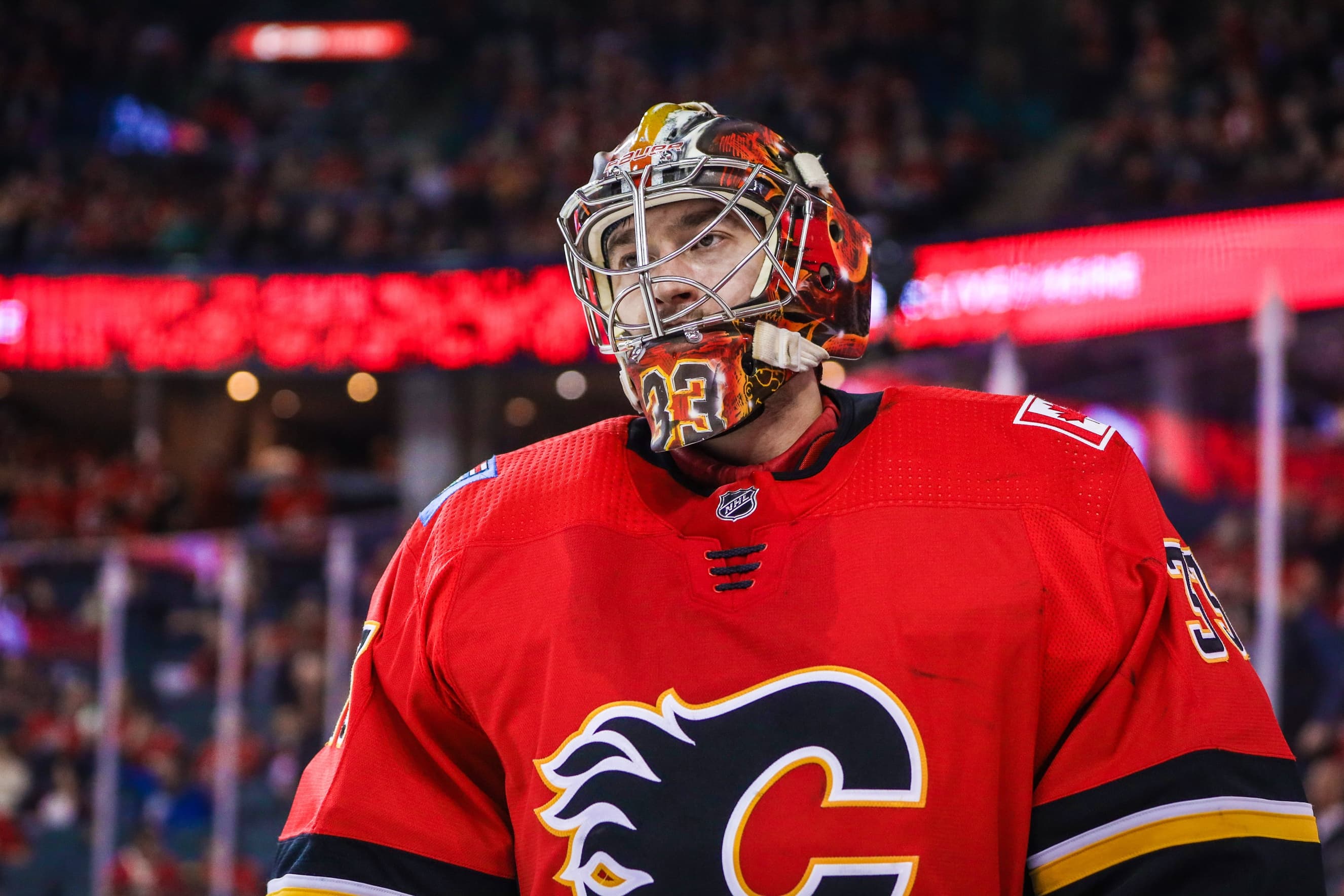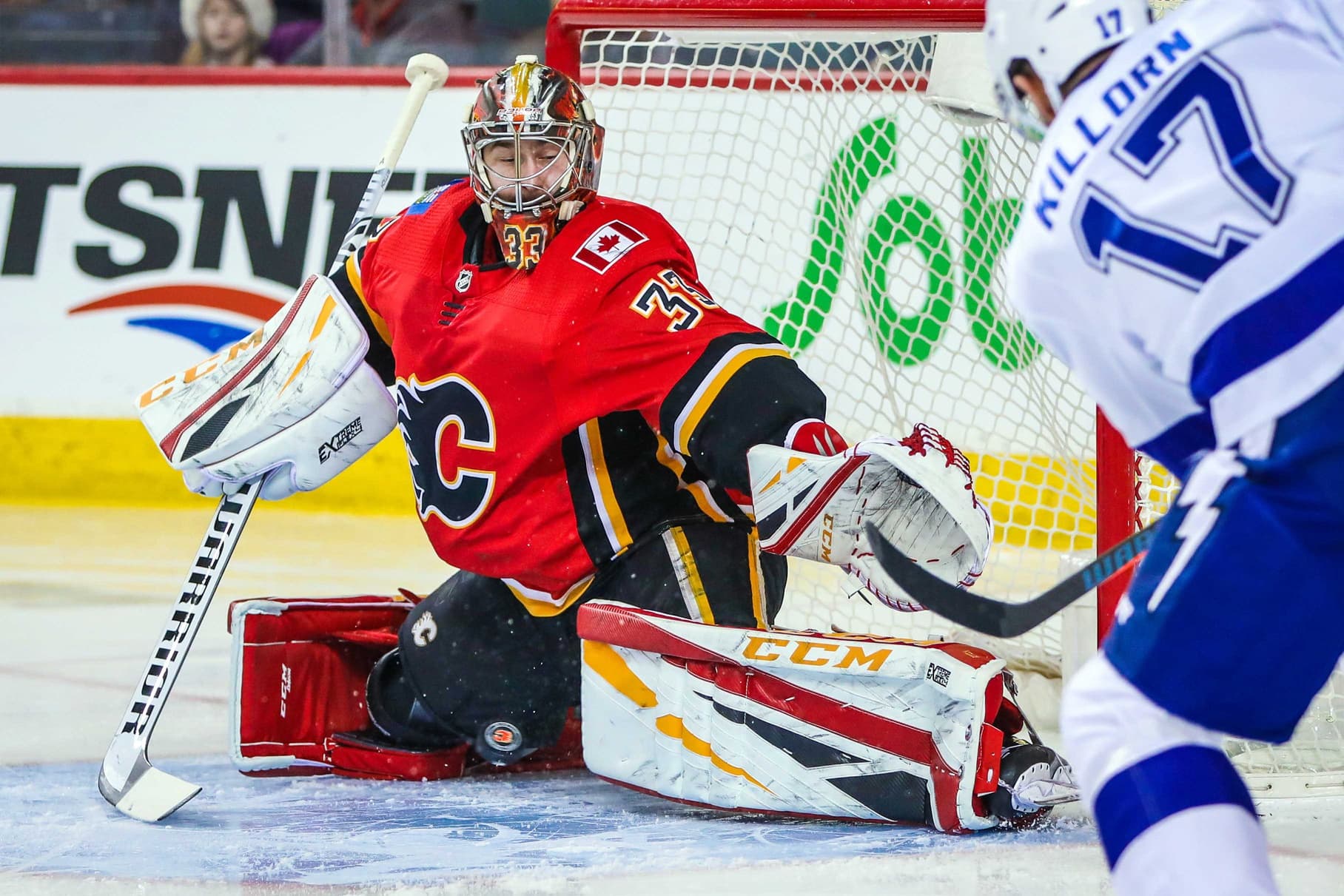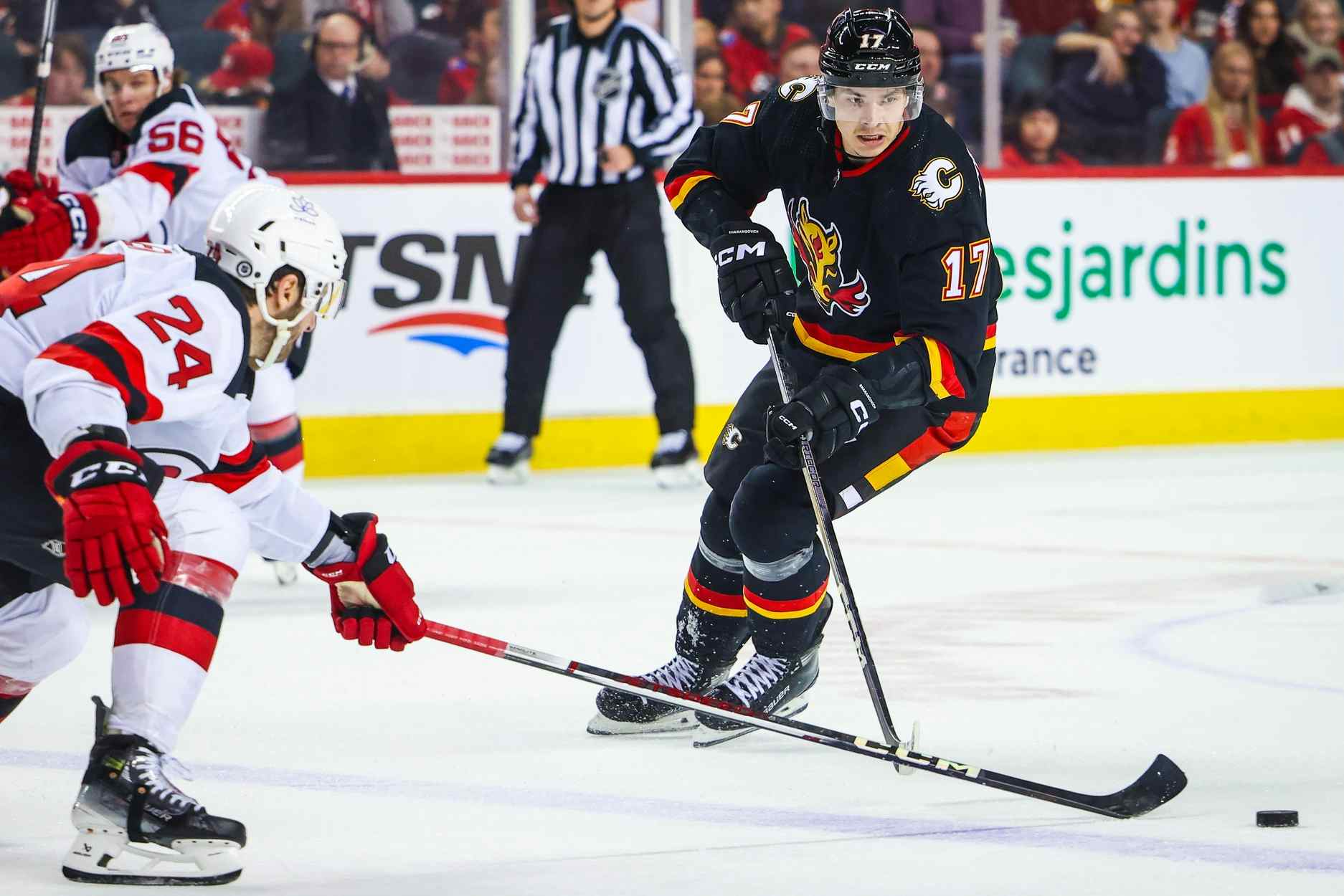What should David Rittich’s next contract look like?

David Rittich will be part of a Calgary goaltending tandem next season, that much we know. What we don’t know is what his next contract will look like. Rittich is a pending restricted free agent this summer, which presents an interesting decision for the Flames. They could easily sign Rittich to a one-year “show me” deal, but there’s plenty to suggest a longer deal might make more sense in the bigger picture.
The body of work
| GS | Record | GAA | SV% |
| 58 | 35-15-8 | 2.70 | 0.909 |
Rittich’s career NHL numbers above are solid, especially if you add a little context. Rittich was a solid backup during the 2017-18 campaign but struggled when handed the reins after an injury knocked Mike Smith out for a month. Last season Rittich saw significantly more playing time, but his year was a tale of two halves.
| Stretch | GS | SV% | EVSV% |
| Oct. 3 – Dec. 31 | 20 | 0.920 | 0.935 |
| Jan. 1 – Apr. 6 | 22 | 0.902 | 0.910 |
We found out after the season that Rittich suffered an injury in a December 31st game against San Jose and played through it the rest of the way. It’s likely not a coincidence we saw a visible and statistical drop from that point on. Things dropped off considerably for Rittich in the second half of the season, while Smith saw his ice time increase and his overall play improve.
Let’s not forget how strong Rittich was in the first half of the season, though. With Smith struggling, Rittich took the mantle as Calgary’s number one and was one of the NHL’s best until January. It was a limited stretch, of course, but gave us a solid glimpse of what Rittich was capable of at the highest level. It was certainly enough evidence to convince me he should be part of the Flames’ goaltending fold going forward.
There’s no saying how much Rittich’s lingering injury affected him and his play in the second half. There could have been plenty of other things contributing, whether it be fatigue, a brighter spotlight, or the pressure of more important games. For me, though, knowing an injury timed up almost exactly to a decline in play is enough to give Rittich benefit of the doubt for a less impressive final few months.
The comparables
Rittich’s situation is somewhat unique. He’s got number one potential and is part of Calgary’s plans going forward, but Rittich’s leverage is limited due to a smaller body of work. How much, and how long, do you pay a guy with lots of potential but less than two NHL seasons under his belt? There’s no easy answer, but a look back at similar situations in recent years helps set a market.
Plotted below are five goalies in similar spots prior to signing their first “big” contract. For comparison’s sake, I’ve included stats in the two seasons they played prior to signing, excluding Dubnyk and Hammond. In those two cases, I included numbers after each guy burst onto the scene with their respective teams in the 2014-15 season.
| Goalie | Team | Age | Year | GS | Record | SV% | Contract |
| David Rittich | CGY | 27 | 2019 | 58 | 35-15-8 | 0.909 | ????? |
| Juuse Saros | NSH | 20 | 2018 | 43 | 21-14-10 | 0.923 | 3 x $1.5 million |
| Petr Mrázek | DET | 24 | 2016 | 75 | 43-25-8 | 0.920 | 2 x $4 million |
| John Gibson | ANA | 22 | 2016 | 24 | 16-8-0 | 0.919 | 3 x $2.3 million |
| Devan Dubnyk | MIN | 29 | 2015 | 39 | 27-9-2 | 0.936 | 6 x $4.33 million |
| Andrew Hammond | OTT | 27 | 2015 | 23 | 20-1-2 | 0.941 | 3 x $1.35 million |
Dubnyk is the high water mark and Minnesota’s risk has paid off in a big way. Despite having him for only half a season, the Wild saw enough in Dubnyk to sign him long-term while keeping his cap hit down. They made the right call; Dubnyk is a legit NHL number one and has given Minnesota a ton of cap flexibility. Getting quality work over 60-65 starts per season at $4.33 million is a bona fide bargain these days.
Interestingly, the Senators went in a different direction. While they rewarded Hammond with a three-year deal, Ottawa also seemed to realize he was more flash in the pan than future number one. That decision has also proven to be the right one; The Hamburgler isn’t even in the organization anymore and has returned to being a career minor leaguer.
Rittich falls somewhere in the middle of Dubnyk and Hammond, although I think he’s closer to the former than the latter. While his numbers come in below any of the goalies listed, Rittich has leverage that didn’t exist for the likes of Saros, Mrázek, and Gibson: he’s eligible for UFA status next summer. As such, it’s more difficult to use those three deals as straight-across comparables Rittich.
Conclusion

The Flames have a real opportunity to get Rittich signed to a team-friendly deal this summer, and it’s an opportunity I think they need to pounce on. Getting Rittich locked up for a few years at a decent number has the potential to give Calgary much needed cap flexibility. Sure, there’s risk involved; goalies seem to be more voodoo than science, so there’s risk involved with any multi-year deal signed these days.
Knowing what Rittich has done to this point, and knowing what he could be, I believe the potential payoff outweighs any risk assumed by the Flames. We’re talking about a team that hasn’t had a long-term number one since Miikka Kiprusoff retired in 2013; that’s six straight seasons of short-term plans and shots in the dark. Rittich isn’t a sure thing, but he’s the team’s first legit chance at a consistent number one in more than a half-decade.
So let’s talk turkey. A one-year deal makes no sense for Rittich, because it allows him to leave as an unrestricted free agent next summer. That could be a nightmare if he puts together a strong season in 2019-20; Calgary would have to pay a much higher premium in that case or risk losing him for nothing. For me, three or four years sounds a lot better.
Let’s plot Rittich somewhere between Saros/Gibson and the high bar set by Dubnyk. Factoring in numbers, cap inflation, and Rittich’s age/UFA eligibility, something like $2.5 per over three years or $2 million per over four years seems realistic. If it’s something Rittich’s camp is open to it, a deal in that range makes a lot of sense for the Flames.
Playing the long game isn’t always comfortable with goalies, but as the comparable deals above show, it can pay off nicely. Assuming risk goes along with the goaltending position, but if Rittich continues trending positively, that risk will be mitigated in short order.
Recent articles from Pat Steinberg





